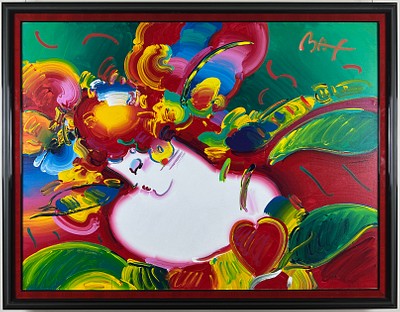Robert Rauschenberg "Scanning, 1963" Offset Lithograph
Lot 767
Categories
Estimate:
$500 - $750
Absentee vs Live bid
Two ways to bid:
- Leave a max absentee bid and the platform will bid on your behalf up to your maximum bid during the live auction.
- Bid live during the auction and your bids will be submitted real-time to the auctioneer.
Bid Increments
| Price | Bid Increment |
|---|---|
| $0 | $5 |
| $100 | $10 |
| $200 | $20 |
| $1,000 | $50 |
| $5,000 | $100 |
| $10,000 | $200 |
About Auction
By Scottsdale Art Exchange
Jul 29, 2023
Set Reminder
2023-07-29 12:00:00
2023-07-29 12:00:00
America/New_York
Bidsquare
Bidsquare : Our Annual Midsummers Day Auction
https://www.bidsquare.com/auctions/scottsdale-art-exchange/our-annual-midsummers-day-auction-13196
This auction will feature 900 amazing items. The Auction will include 300 items for our fine art gallery and over 600 items from our consignment partners. Scottsdale Art Exchange sue@firerockfineart.com
This auction will feature 900 amazing items. The Auction will include 300 items for our fine art gallery and over 600 items from our consignment partners. Scottsdale Art Exchange sue@firerockfineart.com
- Lot Description
Robert Rauschenberg was an influential American artist known for his groundbreaking contributions to the Pop Art movement and his innovative approach to combining various artistic mediums. Here are some key points about Robert Rauschenberg and his artistic achievements: 1. Early Life and Education: Robert Rauschenberg was born on October 22, 1925, in Port Arthur, Texas. He studied at the Kansas City Art Institute and later attended the renowned Black Mountain College in North Carolina, where he received a well-rounded education in various art disciplines. 2. Combining Artistic Mediums: Rauschenberg was known for his experimental approach to art, breaking down the boundaries between different artistic mediums such as painting, sculpture, photography, printmaking, and performance. He often combined these mediums in his artworks, blurring the lines between them and creating multimedia installations. 3. "Combines": Rauschenberg's most famous works are his "Combines," which were hybrid pieces that merged painting and sculpture. These artworks incorporated found objects, everyday materials, and imagery sourced from popular culture, creating layered and visually complex compositions that challenged traditional artistic conventions. 4. Pop Art Influence: Rauschenberg was an influential figure in the emergence of the Pop Art movement in the 1960s. Alongside artists like Andy Warhol and Roy Lichtenstein, Rauschenberg incorporated imagery from mass media, consumer culture, and popular icons into his work, reflecting the vibrant and dynamic nature of contemporary society. 5. Collaboration with Merce Cunningham and John Cage: Rauschenberg collaborated extensively with choreographer Merce Cunningham and composer John Cage. His set designs and costumes for Cunningham's dance performances were innovative, incorporating movement, technology, and multimedia elements. 6. Erasing the Boundaries: Rauschenberg constantly pushed the boundaries of what art could be. He embraced chance, spontaneity, and improvisation in his creative process, often incorporating elements of performance and audience participation into his works. His innovative approach challenged the traditional notions of authorship and originality in art. 7. Awards and Recognition: Rauschenberg received numerous awards and honors throughout his career, including the Golden Lion at the Venice Biennale in 1964 and the National Medal of Arts in 1993. His work continues to be celebrated and exhibited in major museums and galleries worldwide. Robert Rauschenberg's artistic contributions revolutionized the art world and continue to inspire generations of artists. His ability to blur the lines between mediums, embrace new materials and technologies, and challenge artistic conventions made him a pioneering figure in contemporary art.
Measures 40 x 30.Good condition. No rips, tears, creases.Condition
- Payment & Auction Policies
-
Available payment options
-
-
- Buyer's Premium



 EUR
EUR CAD
CAD AUD
AUD GBP
GBP MXN
MXN HKD
HKD CNY
CNY MYR
MYR SEK
SEK SGD
SGD CHF
CHF THB
THB



















